新概念英语青少版4AUnit
新概念青少版4a单词表
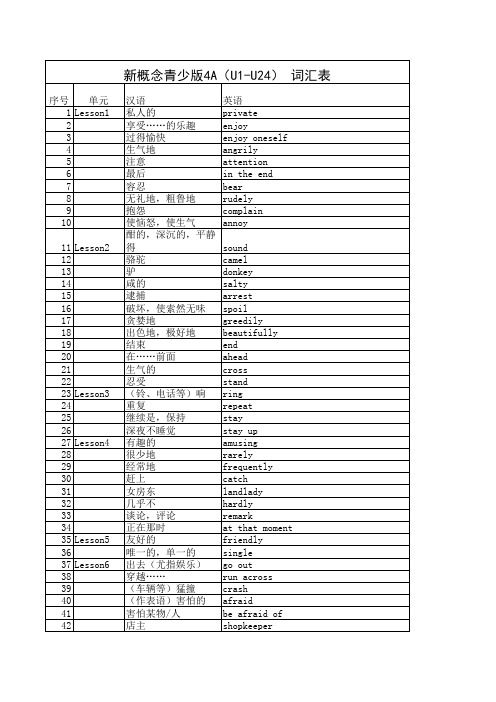
参加…
take part in sth
241 lesson24 行李
luggage
242
喂养
feed
243
愚蠢地
stupidly
244
结束
be over
245
胜任
be up to
246
有能力的
capable
247
有能力做某事
be capable of
248
创造…建立…
set sth.on sb/sth
短途旅行
excursion
乞求
beg
89
一般的,大体的
90 lesson11 乞丐
91
向某人要某物
92
报答
93
作为对…的报答
94
拜访光顾
95
作短暂访问
96 lesson12 面粉
97
胶水
98
罐,桶
99
汽水
100
矿泉水
101
冰咖啡
102
可口可乐
103
风景
104
跟随
105
提神的
106
把某物从..撞倒
107
221
专家
222
召来某人
223
建造
224
圆顶
225
装饰
226
完成 竣工
227
巨资
228
挖掘
229
挖出某物
MRI invent compose design fix rent electricity inspect newsagent deliver deliver sth.to sb headmaster punish punish sb.for sth destroy turn deserve salary once at once educational portrait landscape practise tai chi country fish fish for sth yard firefighter advise review stranger cheer taj Mahal emperor ruler in honour of sb/in sb's honour expert call sb.in construct dome decorate complete fortune dig dig sth.up
新概念英语青少版4A Unit 4

.
10
Key Structures
Finish the exercises.
.
12
ded Conversation
1. From my brother. 2. In Australia. 3. For six months. 4. He’s an engineer. 5. A big firm. 6. Yes, he has. 7. An Australian car. 8. To Alice Spring. 9. Darwin. 10. To Perth. 11. No, he won’t.
ii. 动作开始于过去,现在仍在继续或刚刚结束。这 时经常与for+一段时间或since+时间点一起使用
He has been there for six months.
He has never been abroad before.
iii. 动作刚备完成,例如I have just received a letter from my brother.
Unit 4 An Exciting Trip
.
1
An exciting trip
I’ve just received a letter from my brother Tim. He is in Australia. He’s been there for six moths.
.
2
An exciting trip
新概念英语青少版4A Unit 2
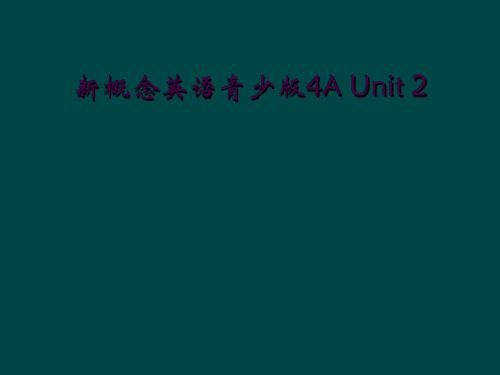
Guided Conversation
4. i) Did your aunt Lucy telephone just then? ii) Who telephoned just then?
5. i) Had she come by train? ii) How had she come?
6. i) Was she coming to you? ii) Who was coming to see you? iii) When was she coming to see you?
Grammar
一般现在时与频度副词never, sometimes, usually, always, ever等连用 现在进行时表示现在正在发生的事情,例如: I’m still having breakfast. 介词by 可表示交通方式,例如: by train, by bicycle, by boat, by car, by plane 介词on可表示日期和星期的连用,如on Sundays it做主语时可指代天气、日期和时间等,例如: It was raining/ Sunday.
对比now 和 often& always
Exercises
1. are playing… play… is kicking… is running
2. are you doing… am leaving… are you leaving… come… go… listen… feel
将频度副词代入
wonderful actors 不错的演员们
Pattern Practice
an entertaining play 一个娱乐性质的表演
Pattern Practice
新概念英语青少版4A-Unit-13教学文案

Key Structures
b) 通常来说,将来进行时不表示意愿。 在I’ll come to your house tomorrow这句话中, 动词表达了要来的意愿或许诺,但是I’ll be coming to your house tomorrow 只表示安排, 不表示意愿。
我们可以将以上两个句子补充完整,区别更 加明显:
① I’ll come to your house tomorrow, so we can discuss the matter. ② I’ll be coming to your house tomorrow, so
Special Difficulties
名词所有格的用法 Whose is this? It’s Tom’s. It belongs to Tom. Whose are those? They’re the children’s. They belong to the children.
Guided Conversation
• Tell the story, using these key words
Pattern Practice
1. 对事实而非意愿的询问 2. 现在进行时与将来进行时用法比较 3. 一般将来时表示意愿 4. 对事实的描述
Key Structures
a) shall 和will be doing构成将来进行时 现在进行时与将来进行时都表示正在进行的 动作,只是发生的时间不同, 比较: I am writing letters now. 表示此刻正在进行的 动作。 I shall be writing letters all day tomorrow. 表示 明天正在进行的动作。
Listening and Understanding
青少版新概念英语第4A册单词默写表 (中英)
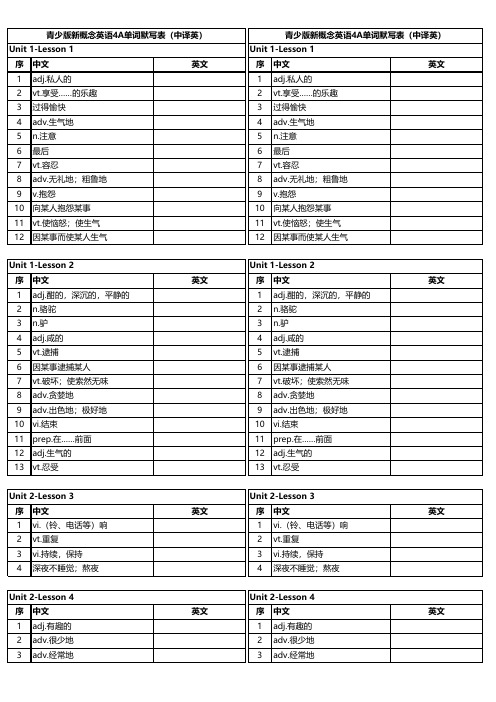
26生活费26生活费27n.污染27n.污染28靠……为生28靠……为生29vi.同意29vi.同意30同意…....30同意…....31vi.注意31vi.注意32当心…...32当心…...33vi.夸耀33vi.夸耀34向某人炫耀…...34向某人炫耀…...35vi.由……组成35vi.由……组成36由……组成36由……组成37vi.绝望37vi.绝望38对…....绝望38对…....绝望39vt.听说39vt.听说40从某人那里听说…...40从某人那里听说…... 41听说关于某人的某事41听说关于某人的某事42摆脱,除掉42摆脱,除掉43除掉某人/物43除掉某人/物44vt.怀疑44vt.怀疑45怀疑某人做某事45怀疑某人做某事46对…....感到疲倦46对…....感到疲倦47vt.保护,保卫47vt.保护,保卫48保护…....免受…....48保护…....免受….... 49vi.不同于49vi.不同于50不同于…....50不同于…....51vt.解雇,开除51vt.解雇,开除52把…....从……开除52把…....从……开除53vt.得到,获取53vt.得到,获取54从…....获取…...54从…....获取…...55vi.浮现,出现55vi.浮现,出现56从…....出现56从…....出现57vt.免除责任57vt.免除责任58免除…....做58免除…....做59vi.阻碍59vi.阻碍60阻碍……做某事60阻碍……做某事61vt.禁止61vt.禁止62禁止……做某事62禁止……做某事63vt.保护63vt.保护64保护……免受……64保护……免受……65v.分开65v.分开66把……与……分开66把……与……分开67vi.遭受(痛苦)67vi.遭受(痛苦)68遭受……痛苦68遭受……痛苦69vt. 使用,雇用69vt. 使用,雇用70雇用……做某事70雇用……做某事71vt.参加71vt.参加72让某人参加做某事72让某人参加做某事73vt.包括73vt.包括74把……包括到……中74把……包括到……中75vi.沉溺于75vi.沉溺于76沉溺于……76沉溺于……77vt.指导77vt.指导78在……方面指导某人78在……方面指导某人79vt.投资79vt.投资80对……进行投资80对……进行投资81vt.参与81vt.参与82让…...参与…...82让…...参与…...83vi.坚持83vi.坚持84坚持做某事84坚持做某事85vt. 以……为基础85vt. 以……为基础86把……建立于……的基础之上86把……建立于……的基础之上87vi.评论87vi.评论88评论某人/事88评论某人/事89vi.集中89vi.集中90集中精力在……上90集中精力在……上91vt.计算91vt.计算92指望某人/物92指望某人/物93vi.依靠93vi.依靠94依靠某人/物94依靠某人/物95vi.着手95vi.着手96开始做某事96开始做某事97vi.试验97vi.试验98用……做试验98用……做试验99坚持做某事99坚持做某事100vt.& vi. 斜靠100vt.& vi. 斜靠101把……斜靠在……上101把……斜靠在……上102vi.起作用;动手术102vi.起作用;动手术103对……起作用;给某个身体部位动手术103对……起作用;给某个身体部位动手术104vt. 以……自豪104vt. 以……自豪105以做某事而自豪105以做某事而自豪106依赖某人/物106依赖某人/物107vi.投票107vi.投票108投票赞成/反对……;就……进行投票108投票赞成/反对……;就……进行投票109n.小费109n.小费110adj.订婚的110adj.订婚的111与某人订婚111与某人订婚112adj. 准时的112adj. 准时的。
新概念青少版4A-lesson1

Guided Conversation
4.Guided summary .Write a complete sentence in answer to each question,to make a paragragh of not more than 55words.
5.Talk about you. 1)When did you last go to the theatre/cinema?What was the show? 2)When did you last get angry?Did you complain?What happened? 3)Do you often get angry? What kinds of things annoy(骚扰)you?Do you usually complain ,or do you keep quite?
A young man and a young woman were sitting behind me. They were talking loudly. I got very angry. I could not hear the actors.
loudly 大声地
Listening and understanding
cinema
Listening and understanding
Answer the question:
Why did the wri来自er complain to the people behind him? (抱怨)
Listening and understanding
4
3
1
Listening and understanding
turn round 转身 angry生气的 angrily生气地 pay attention 专心 bear 承受
新概念英语青少版4A:Unit15Goodnews!课件
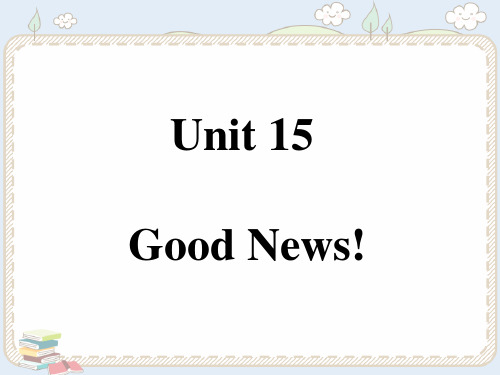
Listening and Understanding
The secretary told me that Mr. Harmsworth would see me.
Listening and Understanding
I felt very nervous when I went into his office. He did not look up from his desk when I entered.
Listening and Understanding
After I had sat down, he said that business was very bad. He told me that the firm could not afford to pay such large salaries. Twenty people had already left. I knew that my turn had come.
4 said 是一般过去时,所以其后的间接引语中 的时态需要产生变化。注意缩略式的用法。
Key Structures
say 和tell引导的间接引语 a 动词say和tell经常引导间接引语。Tell后面必须跟有 间接宾语。而连词that并不是必须有的,可以省略, 例如: He tells me (that) he’s busy. b 时态关联的基本原则: i 引导动词为现在时态时,间接引语没有时态的变化 ii 引导动词为过去时态时,间接引语需要有所变化: 一般现在时变为一般过去时;现在完成时变为过去完 成时;一般过去时变为过去完成时。但是,在口语中, 一般过去时经常不产生变化,因为它通常不会引起关 于动作产生顺序的误解。
新概念青少版4a单词表
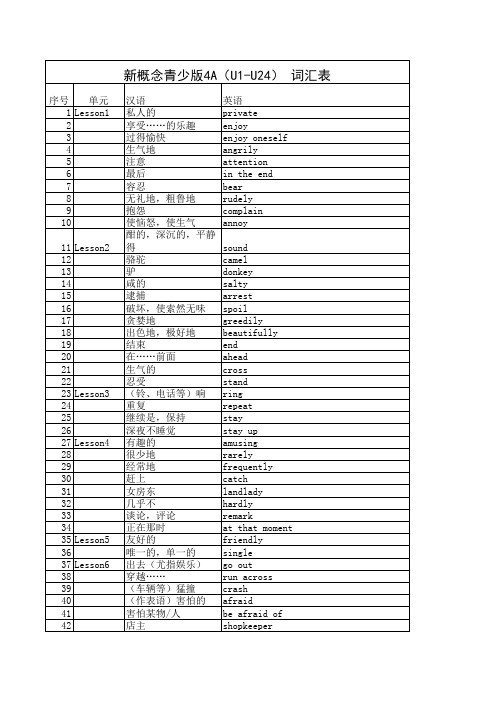
307
乘客
passenger
308
回答,做出反应
respond
309 lesson29 精神紧张的
nervous
310
从…抬头看
look up from sth
311
负担得起
afford
312
压力
pressure
313
面临压力
unter pressure
value
146
抢劫
rob
147
抢劫某人的某物
rob sb of sth
148 lesson15 使参加
enter
149
为…报名参加…
enter sb for sth
150
整齐的,整洁的
neat
151
小路,小径
path
152
孔子
Confucius
153 lesson16 相貌好看的
good-looking
249
演出
perform
250
对…实行,在…表演 perform sth.on sb/sth
251
缺席的,不在的
absent
252
缺席某事
absent form
253
创造
create
254
航行
voyage
255
发生
take placeΒιβλιοθήκη 256海洋ocean
257 lesson25 小组,团体
group
参加…
take part in sth
241 lesson24 行李
luggage
242
喂养
feed
243
新概念英语青少版4A Unit 4 PPT

Reading
six… disappointed… today… birthday cards cards… presents… postman… delivered… mother… What has happened to the post? strike… deliver your cards find… some… collect them on their way… post office happy… after all
结束
Tim is an engineer. He is working for a big firm and he’s already visited a great number of different places in Australia.
An exciting trip
He’s just bought an Australian car and he is going to Alice Spring. A small town in the center of Australia. He will soon visit Darwin. From there he will fly to Perth. My brother has never been abroad before. So he finds this trip very exciting.
Unit 4 An Exciting Trip
An exciting trip
I’ve just received a letter from my ustralia. He’s been there for six moths.
An exciting trip
新概念英语青少版4A Unit 10

Words and Expressions
clavichord n. 古钢琴,翼琴
It is called a clavichord. 它被称作古钢琴。
Words and Expressions
belong to 属于
They belong to someone. 他们肯定属于某人。
Words and Expressiห้องสมุดไป่ตู้ns
damage n. 损害;损毁;赔偿金 vi. 损害;损毁 vt. 损害,毁坏
He sued them for damage. 他要求他们赔偿损失。
Words and Expressions
jazz n. 爵士乐,爵士舞;喧闹
Do you like jazz? 你喜欢爵士乐吗?
Words and Expressions
而有些句子则需要加上执行者或其他短语, 来使其意思表达完整,例如:This music was composed in 1816.
Exercises
完成A部分(口语回答) 1. Our old musical instrument is called a
clavichord. 2. It is made in Germany. 3. It is kept in the living room. 4. It was bought many years ago. 5. It was damaged recently. 6. Two of the strings were broken. 7. My father was shocked.
Listening and Understanding
My father was shocked.
青少版新概念教案4A-unit14

青少版新概念教案4A-unit14新概念英语4A备课教案周次第次月日主题Lesson 14 Do you speak English?教学目标1. 学习课文中外出搭车话题的故事;2.复习过去完成时的用法;3.学习正确的英语语音语调。
教学重难点:1单词:出行相关词汇2. 语法:过去完成时,代词either,neither,both的用法3.学习理解礼貌交际教学过程一.Warm-up :1.Greeting and review the last unit.2.Free talk about .二.Presentation1. Look at the pictures and guess the meaning。
2. Listen to the story twice and understand the general ideas and underline the new vocabulary or phrases.3. Answer the questions:1 What did you have last year? (An amusing experience.)2 What part of France were you in? (The south of France.)3 Had you been in a small village? (Yes, I had.)4 Where did you drive on to? (The next town.)5 Who waved to you on the way? (A young man did.)6 What did he ask you for? (For a lift.)7 When did you say good morning to him? (As soon as he had got into the car.)8 What language did you speak? (French.)9 Did your passenger reply in French? (Yes, he did.)10 How many words of French do you know? (A few words.)11 Did you speak to him during the journey? (No, I didn't.)12 When did he suddenly say something? (When I had nearly reached the town.)13 What did he ask you? (He asked me if I spoke English.)4.T-ss build the story together picture by picture and pay attention to the dialogs, new words and phrases.5.Retell story with giving clues writing by teacher on board.三. .Grammar teaching:过去完成时结构:had+过去分词,代词either,neither,both的用法四.Finish the practice五.Homework: 1.Copy and memorize the new vocabulary.2. Recite the text.3. Finish the grammar exercise.。
新概念英语青少版4A Unit 1电子教案

Listening and Understanding
Last week I went to the theatre. I had a very good seat. The play was very interesting. I did not enjoy it.
Listening and Understanding
A young man and a young woman were sitting behind me. They were talking loudly. I got very angry. I could not hear the actors.
Listening and Understanding
7. i) Did you look at the man and the woman angrily?
ii) How did you look at the man and the woman?
Guided Conversation
4. Guided summary.
The write went to the theatre last week. He did not enjoy the play. A young man and a young woman were sitting behind him. They were talking loudly. The writer could not hear the actors. He turned around. ‘I can’t hear a word!’ he said. ‘This is a private conversation!’ the young man said.
新概念英语青少版4A Unit 9PPT课件
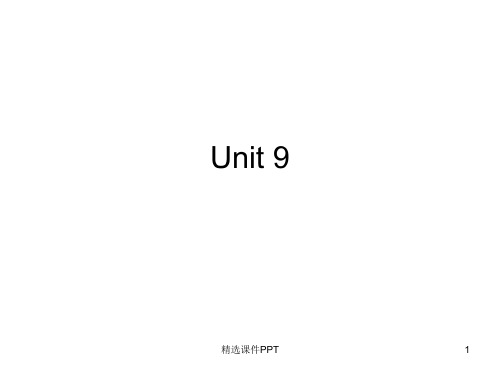
精选课件PPT
3
CBCAB
Reading
精选课件PPT
4
Grammar
表示时间的介词,如
on Wednesday(afternoon); in 1939, in July, in the afternoon, in ten minutes ; at eight o’clock; from 9 till 5;during the night; not… until 10 o’clock.
the twenty-seventh of April)
用于固定短语中,例如:on Christmas Day 用于其他结构中,例如:on Monday morning, on your birthday
精选课件PPT
10
Key Structures
d 注意以下词语的用法: from… till/until 用于表示一段时间,例如:from Monday till Friday, from Christmas till now; during 表示贯穿某一时期,例如: during the night, during the war;或表示在一段时间内,例 如:He spoke twice during the meeting. until表示直到某一时刻,例如: He will not arrive until 10 o’clock. 表示在10点钟 时,而不是在10点之前。比较: He will arrive by 10 o’clock. 表示在10点之前的 某个时间。
Unit 9
精选课件PPT
1
Listening and Understanding
What does ‘a cold welcome’ refers to?
